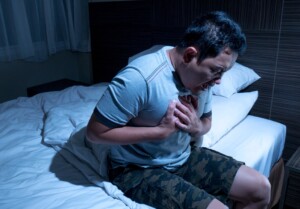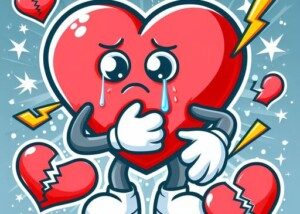
You settle comfortably in bed and are halfway between wakefulness and falling sleep when suddenly you realize you’ve stopped breathing:
You’re gasping for breath, trying to get in air.
The episode lasts only a second or two. It’s short-lived and gone as quickly as it came on, having snapped you out of your semi-sleep.
You then relax again and are nodding off, drifting into slumber when, SH*T, it happens again!
Waking up feeling as though your air supply has been stopped can also occur as you’re coming out of sleep in the morning.
Why does your breathing keep stopping just as you’re falling asleep?
• This scary problem is even more puzzling to those who are physically fit, healthy and not overweight and especially younger than middle age.
• What if an episode of stopped breathing stays that way – and you never wake up – and die in your sleep?
A Type of Sleep Apnea Scarier than Obstructive Sleep Apnea
“Transitional sleep apnea, also known as central sleep apnea, occurs when the patient periodically doesn’t breathe at all or breathes very shallowly so that there is a lack of oxygen,” says Dr. C. Phillip Amoils, MD, a board certified otolaryngologist with SC-ENT Ear, Nose & Throat Specialists in CA.
“This causes the patient to wake up, at least briefly,” continues Dr. Amoils.
Transitional sleep-disordered breathing is not made worse by obesity, smoking, drinking, a thick neck, a big tongue, large tonsils, a small jaw or narrow airway.
Another name for this phenomenon is sleep-onset apnea.
Dr. Amoils explains, “Obstructive sleep apnea originates from a mechanical problem where there is a collapse of an airway which can be corrected by either surgery or CPAP machine.”
An example of a surgical correction is the removal of excess pharyngeal tissue that blocks the airway when it collapses during sleep.
“Whereas transitional or central sleep apnea is more challenging because the signal from the brain to the body isn’t working correctly — there’s something going on with the breathing center.”
Essentially, your brain is forgetting to tell your body to keep breathing. So breathing stops.
When the oxygen level in your bloodstream gets below a certain point, this causes a conscious arousal – making you aware that you have not been breathing.
The natural reflex is to then gasp for air. You fall back asleep and the cycle repeats.
Some people find that they cannot fall asleep because the cycle keeps happening over and over.
Finally they do fall asleep, often after switching to a different position or moving from their bed to a sofa.
Can You Die in Your Sleep from Transitional Apnea?
You will not die because the low oxygen levels will force you into a conscious or semi-conscious state, leading to resumed respiration.
The situation can be brought on or worsened by anxiety, especially anxiety about the situation.
Central apneas are one reason why those with obstructive apnea, who correctly use a CPAP machine, may still experience a few disordered-breathing events per hour while in slumber.
Those events are likely central apneas.
What Should You Do?
Dr. Amoils says that “the great majority of patients with central sleep apnea also have obstructive sleep apnea, so it is usually a combination of the two.
“Both central sleep apnea and obstructive sleep apnea can be diagnosed through sleep studies.”
A sleep study is known as a polysomnography.
“However, the majority, around 80%, will have obstructive sleep apnea. Central sleep apnea is mostly associated with a severe chronic illness [such as chronic heart failure].”
If transitional apneas are scaring the daylights out of you, you should consider a sleep study.
Just when You’re Falling Asleep
It’s possible that your central apneas are occurring only on the cusp of sleep.
But if you can sleep through a loud doorbell, a lawnmower outside, someone using the blender, etc., then it’s very possible that you’re having more central apneas during deeper sleep and are not being aroused to enough consciousness to be aware of them.
For very light sleepers who have transitional apneas, and do not wake up gasping for breath except only when they are near falling asleep, it’s very possible that sleep transition is the only time that these centrals are occurring.
After all, if a pin dropping in the room can awaken you, then certainly, ceased breathing and its subsequent gasping will, too.
Remedies for Stopped Breathing Upon Falling Asleep
• If you’re on opioid or narcotic drugs, speak to your doctor about getting off them.
• Avoid making bedtime a conditioned stimulus for anxiety (e.g., worrying about breathing problems, next-day’s tasks, bills, your job, relationships, etc.).
• See if sleeping on your side or at a three-quarter angle doesn’t help solve the problem.
• CPAP is also used for central apnea because an airway closure can trigger a central.
• BPAP – another device that supplies pressurized air.
• ASV – another device that supplies pressurized air.
• Supplemental oxygen via a nasal cannula.
• Medications that can stimulate breathing.
• Finally, it’s always best to strive for a physically fit, durable and strong body.
A healthy, lean and fit body always works better amid odd physiological quirks such as sleep-onset stopped breathing than does an overweight, smoke-damaged, out-of-shape body.

Dr. Amoils is considered among the best surgeons worldwide for sinus surgery and OSA, having helped thousands of patients for 30+ years. He also demonstrates to physicians the protocols he’s developed for mouth breathing, nasal congestion, obstructive sleep apnea and snoring using minimally invasive procedures.
 Lorra Garrick has been covering medical, fitness and cybersecurity topics for many years, having written thousands of articles for print magazines and websites, including as a ghostwriter. She’s also a former ACE-certified personal trainer.
Lorra Garrick has been covering medical, fitness and cybersecurity topics for many years, having written thousands of articles for print magazines and websites, including as a ghostwriter. She’s also a former ACE-certified personal trainer.
.









































